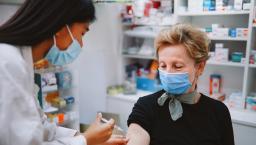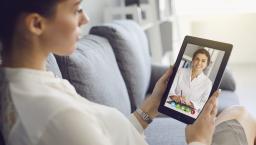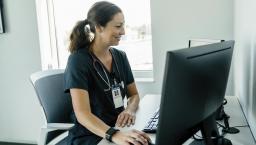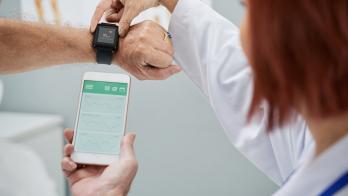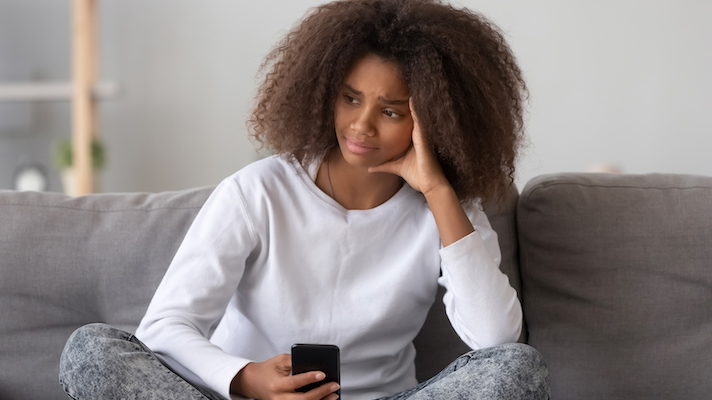
About the author: Aline Noizet is a connector by heart. Founder of Digital Health Connector, she is passionate about digital health, innovation and connecting the right people to have an impact on patients' lives and support healthcare professionals.
The COVID-19 pandemic has increased the pressure on people’s mental health. The times we are currently experiencing are having a major impact on our mental health and put us at risk of developing mental health problems, and will be discussed in more detail at the HIMSS & Health 2.0 European Digital Event (7-11 September 2020). Uncertainty, fear and isolation are creating anxiety. During the lockdown phases that have taken place across the globe, digital has become the 'new normal' way to receive support or treatment for mental health issues, as access to the traditional forms of healthcare services have been limited.
The impact on sleep quality
Big Health, who recently raised their series B, have been focusing on improving poor sleep with their app Sleepio. They saw a jump in the use of their app during the past few months due to insomnia and other sleep issues, according to Dr Charlotte Lee, UK director of Big Health, "We had more sign ups in two months than we had in a year in our test bed in Thames Valley".
It is interesting to see how different populations are seeing their sleep being affected in different ways. ‘’Some people may have a reactive anxiety to the pandemic - after having lost jobs, and experiencing significant life disruptions, whereas others are experiencing better sleep e.g. adolescents who are now able to sleep naturally without the pressure of needing to wake up early to go to school," Lee pointed out.
Another phenomenon reported during the pandemic have been unusual or vivid dreams. Dr Dimitri Gavriloff, clinical psychologist and sleep expert at Big Health has two theories to explain those dreams:
‘’First, it is probable that people are reporting better dream recall - they're now getting more sleep in the morning without needing to commute and are waking up during REM enabling them to remember dreams better. Secondly, the reactive anxiety and uncertainty of the situation could be influencing people's dream content, possibly making them more vivid.’’
Citizen empowerment during the pandemic
Hospital Vall d’Hebron in Barcelona, in collaboration with Generalitat de Catalunya launched their app GestióEmo.cional.cat during the lockdown to assess and improve mental health. Dr J. Antoni Ramos-Quiroga, head of the department of psychiatry at the hospital, who led that project shared the first results:
‘’After the first month of the launch the app reached more than 300,000 downloads. The app gave citizens the opportunity to assess their emotional status easily and to have quick access to mental health resources, at a time when the majority of community mental health resources didn’t have face-to-face appointments. The app helped empower citizens in the management of anxiety and depressive symptoms with a total of 15 resources such as mindfulness exercises’’.
Meditation or mindfulness were recommended a lot over the last few months. Relaxation and breathing techniques have been very popular in Asian countries and are progressively making their way into the European culture, even though people tend to have a misconception about what they specifically are and how they can help.
Pablo Pantaleoni, VP and MD of Headspace Health, one of the leading mindfulness apps, commented: ‘‘Headspace has been shown to have positive outcomes on mental health including reduced stress and anxiety, decreased negative emotions and increased resilience. Many healthcare professionals are recommending Headspace during this time to help people manage stress and anxiety and also to aid in getting better sleep."
Increased access to eHealth tools
Some hospitals and health centres have been treating patients’ mental health using eHealth tools. Barcelona-based Hospital Vall d’Hebron has been using different digital tools in its daily practice for a number of years, including virtual reality (VR) headsets to treat their patients.
‘’VR is an excellent resource to deal with anxiety disorders and also improve comfort in using healthcare resources. VR gives us the opportunity to deliver treatments at home without face-to-face contact, increasing the number of people who can access mental health support.’’ says Dr Ramos-Quiroga. ‘’In general, the patients are very satisfied with the eHealth resources implemented and the adherence to the treatment is very good," he comments.
The rise of digital therapeutics and personalised care
Digital therapeutics (DTx) - software or app that can replace or complement traditional treatments - has become even more popular as a way to support citizens’ mental health remotely. The FDA even released new guidance that eases regulatory enforcement of DTx treating psychiatric disorders.
Dr Lee, Big Health, reiterated how the pandemic has catalysed digital health which in turn has sparked the culture change to be able to adopt DTx. However she warned that: "It's still a big hill to climb for DTx. One of the prevailing challenges we face is the confusion amongst prescribers and users around what a DTx is - e.g. it's just not clear whether a digital health app which claims to help your mental health will actually work, and what the differences are between products.
"A lot of education is needed around what good evidence looks like, and as a result, people still view DTx as apps, rather than treatments. Until this is resolved we'll continue to see resistance in fully embracing DTx,’’ she concluded.
There will be, without a doubt, a before and an after COVID-19 in terms of mental health treatment, as suggested by Dr Ramos-Quiroga: ‘’One of the most important takeaways from the pandemic is that eHealth is not luxury, it is a real need. A lot of clinicians didn’t have contact with eHealth care or were reluctant to use digital tools. Now, after the lockdown, a lot of clinicians understood the importance and the usability of eHealth assessment and treatments. They clearly have seen that with digital tools it is possible to deliver quality health care, in a more efficient and personalised way.’’
More information about the HIMSS & Health 2.0 European Digital Event (7-11 September 2020) can be found here.






